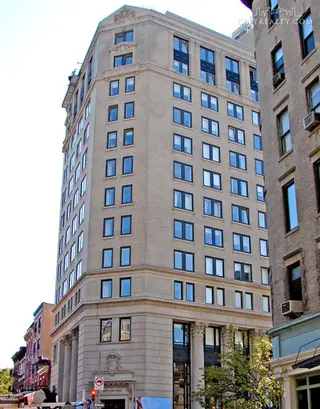 Carter Horsley
Carter HorsleyDec 23, 2011
Carter's Review
One of the most imposing buildings in NoLiTa, The Spring at 225 Lafayette Street on the southeast corner at Spring Street, was erected in 1927 and designed by Cass Gilbert, the architect of the Woolworth Building overlooking City Hall Park.
This 14-story building, which is also known as 60 Spring Street, was converted to 40 condominium apartments in 2004 by the LB Group, which consists of Boymelgreen Developers, African Israel Investments and the Leviev Group.
Calvin Tsao of Tsao & McKown designed interiors of the residential conversion for which Ismael Leyva was the architect.
The building has a long frontage on Lafayette Street across from Petrosino Park that was handsomely redesigned in 2012 and is named after Lieut. Joseph Petrosino, the shortest New York City policeman who was the only such officer shot while on duty in Sicily. He was well known for arresting members of the Black Hand, an organized crime organization active in Little Italy. In 2013, its north end was filled with CitiBike racks.
Bottom Line
The city is full of surprises and the area north of Little Italy has two major ones, the former Police Headquarters Building, a domed Renaissance-Revival structure with Baroque flourishes at 240 Center Street and this one, which fronts on a pleasant, triangular park close to several restaurants.
Description
The building has an attractive mid-block entrance on Lafayette Street where it fronts on Petrosino Park. Its chamfered corner at Spring Street has a step-up entrance to a Duane Reade store that occupies the former multi-story interior of the East River Savings Bank.
The building has a three-story limestone base with very tall colonnades on both Lafayette and Spring Streets as well as tall columns. The beige-brick building has a nice deep cornice and stringcourses at the third, fourth and 12th floors. A rooftop penthouse with a wrap-around terrace was added at the time of its residential conversion.
Amenities
The building has a doorman, a live-in superintendent and a roof deck.
It has no sidewalk landscaping and no garage but incorporates an entrance to the northbound Lexington Avenue subway.
Apartments
Apartment 8A is a two-bedroom unit with a gallery that passes an open kitchen to a 27-foot-long living/dining room.
Apartment 14A is a two-bedroom unit that has a 19-foot-long entrance foyer that opens into a 27-foot-long living with an open kitchen with an island and is adjacent to an open 22-foot-long dining area.
Apartment 10D is a two-bedroom unit with a 13-foot-long entry foyer that leads to a 24-foot-wide living/dining room with an open 16-foot-lon g kitchen with an island. The unit has a 13-foot-long office.
Apartment 9C is a two-bedroom unit with a long entry foyer that leads to a large, angled living/dining room with an open kitchen.
Apartment 7B is a two-bedroom unit with an 8-foot-long entry foyer that leads past an enclosed kitchen to a 23-foot-long living room.
History
The building used to house the East River Savings Bank and its very large and high retail space is now occupied by Duane Reade.
It was also home to Alfred E. Newman, the cover-boy/mascot of Mad Magazine that once had offices on the building’s seventh floor.
Mad Magazine was founded in 1952 and its irreverent and wacky illustrations and satire inspired many intellectuals: Roger Ebert, the great film critic, said that “learned to be a movie critic by reading Mad magazine…I did not read the magazine, I plundered it for clues to the universe.”
Film Director Terry Gilliam said the magazine “become the Bible for me and my whole generation.”
Joyce Carol Oates said it was “wonderfully inventive, irresistibly irreverent and intermittently ingenious American.”
Patti Smith, the singer, was reported to have said that “After Mad, drugs were nothing.”
In May, 2012 a bronze statue entitled “Survival of Serena” by Carole A. Feuerman was installed in the park which is between Lafayette Street and Cleveland Place. The painted statue depicts a young girl in a pink swimming hat apparently soaking in the sun on a rubber tire. The statue was on display for several months.
The intersection offers vistas of several prominent downtown buildings including the former Police Headquarters Building at 240 Centre Street that was converted to residential condominiums, New York by Gehry, a stainless-steel rental apartment tower near City Hall Park, and One Kenmare Square, a sinuously curved horizontally residential condominium building across the park.

- Condo built in 1909
- Converted in 2004
- 2 apartments currently for sale ($2.4M to $4.195M)
- Located in NoLiTa/Little Italy
- 40 total apartments 40 total apartments
- 10 recent sales ($2.2M to $4.6M)
- Doorman
- Pets Allowed

 6sqft delivers the latest on real estate, architecture, and design, straight from New York City.
6sqft delivers the latest on real estate, architecture, and design, straight from New York City.
